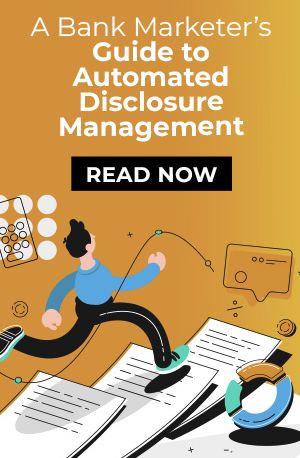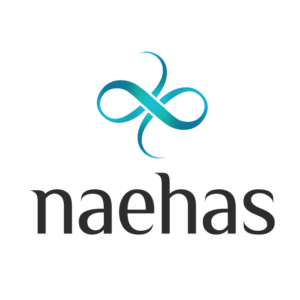Working in a highly-regulated industry, financial services teams – marketing operations/strategy and risk management/legal staff – are often hard-pressed to stay abreast of industry innovations. Leading the charge on regulatory compliance is another tough task. Who can address these pain points? How best to handle the need for speed to market, manual, error-prone processes, coordinating regulated content approvals, improving omnichannel personalization? It’s a heavy lift.
Finding resources to improve operational efficiency is proving critical in today’s volatile, and complex, environment. Lightening that load requires partnerships with platform providers who offer a combination of deep industry knowledge and innovative technology. In this piece, we’ll address the who, how, why and ways to better disclosures.

For those looking to improve their ad content review and disclosure management processes, software solutions are meeting the need for those struggling to improve their regulatory compliance processes, and boost customer retention.
Platform partnerships are increasingly proving that automation reduces compliance risk. Automation takes the heavy lifting out of the compliance process. Built for highly-regulated industries, the technology helps compliance teams gain confidence that customer communications are accurate and compliant.
Akin to friendships, the best partnerships emerge from a fundamental understanding of, and appreciation for, the value each brings to the relationship.
In financial services and insurance, marketing and compliance leaders are learning the benefits of leveraging leading industry cloud technology. Through collaboration and trust, these critical teams are working toward better operational efficiencies and realizing measurable, enterprise-wide outcomes. Improving regulatory compliance, while reducing risk, is key.
As examined in our newest mini eBook, featuring ways to improve disclosure management, the mix of martech leadership and automation, delivered through platform technology, is proving to be a winning combination.
Where Regs Rule
- Banks (National Financial Service Companies, Community Banks, Credit Unions)
- Wealth Management and Investment Advisor Firms
- Financial Technology (FinTech) Start-ups and (likely soon) Buy Now, Pay Later Firms
- Insurance Companies
Whose Job Is It? Spotlight on Compliance Roles
Whether in a bank, wealth management firm, fintech start-up or insurance company, a range of experts take on a variety of roles. Those whose primary function is to manage disclosures answer the complex demands of the highly-regulated industry. In doing so, they coordinate regulated content/collateral review, most often in a marketing capacity, working closely with risk management, legal, compliance and IT staff on a regular basis.
Areas where those dealing directly with these responsibilities are found typically include:
- Marketing Strategy
- Marketing Execution
- Legal, Risk and Compliance
- Digital Services/Operations

Disclosure Management 101
As a leading industry platform, we’re both client obsessed and compliance obsessed. We know our clients must be that way every day. For clients in highly-regulated industries, we deliver deep insight into the complexities of regulatory compliance, we pride ourselves on being a trusted and resourceful partner.
The goal: to guide bank marketing leaders with best practices and been-there-handled-that solutions. To that end, some automation FAQs.
Q: What’s most important when managing disclosures?
A: Whether for a bank, wealth management firm, fintech start-up or insurance company, there are fundamental goals that must be met when managing disclosures for compliance:
- Risk reduction
- Accuracy
- Traceability and Auditability
Q: What challenges do those managing disclosures face that drive them to automation?
A: The most common pain points our clients seek to solve include:
- Disparate systems, duplicative activities, and inconsistent processes
- Increased regulatory and business expectations
- Long cycle times due to highly manual intensive process
- Process was deemed as high risk, as quality control processes were manual
- Increased volume due to more channels and hyper personalization
Q: What are the primary benefits of disclosure management automation?
A: There are 5 critical, compelling ways compliance automation for marketing disclosures delivers value:
- Risk mitigation
- Auditability and Traceability
- Speed-to-Market
- Scale efficiency
7 Solutions for Compliance Success

As noted in the eBook of Disclosure Management Guidelines, AI drives success in many ways. Understanding how to best leverage cloud technology purposely-built for companies in highly-regulated industries is an important cog in the wheel of progress toward achieving greater risk reduction, accuracy and auditability.
- Alleviating the time-consuming minutia of ad reviews
- Allowing teams that were tasked with reviews to focus on other marketing initiatives
- Leveraging workflow to handle the increasing volume of offers
- Securing a better customer experience that expands the relationship
- Reducing manual errors
- Eliminating risk with traceability and auditability
- Avoiding costs from fines imposed by government regulatory compliance failures.
Naehas has established a Resource Center to assist marketing, compliance, risk management and legal teams as they manage disclosures. Through eBooks, case studies, solution briefs, blog series and webinars, our team is committed to advancing understanding of AI-powered platform solutions to achieve measurable, meaningful results for financial services, insurance and other regulated businesses moving forward. Stay informed to stay ahead!







